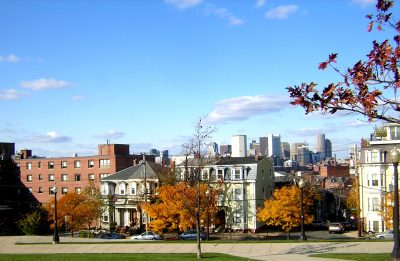
Approximately 40 people gathered at the Strand Theatre Tuesday for a panel discussion regarding criminal justice reform in Massachusetts and the fight to end youth criminalization. The panel was organized by youth activists from the Dorchester Bay Economic Development Corporation’s Youth Force program.
Kimberly Lyle, the associate director for marketing and communications at Dorchester Bay, told The Daily Free Press the panel is only a slice of the DotThought series that began in December.
“It’s part of a larger series that we launched called DotThought,” Lyle said. “Dorchester Bay wanted to create a space where we can address lots of issues that are impacting our community and the folks that we serve.”
Lyle said she hopes people at the forum, including herself, can learn about the systematic criminalization of young people and ways they can combat it.
“Primarily, I hope that they learn something about some of the actions that are being taken to decriminalize youth,” Lyle said. “I’m hoping folks who attend can come away learning something new about the issues and may even feel encouraged to participate in and take action.”
Dan Gelbtuch, a community organizer and youth coordinator for Dorchester Bay, told The Daily Free Press the idea for the discussion came about after the Dorchester Bay Youth Force started to look into injustices facing their generation.
“Obviously, a lack of employment is one, but they [the Youth Force members] were quick to see that the injustices connected to the criminal justice system in terms of mass incarceration and the racism that is at the root of that system were also affecting a lot of their friends and family members,” Gelbtuch said.
Gelbtuch said each of the panelists brings something unique to the discussion.
“I’m just really excited about the diversity of the panel because we’re getting people from different parts of criminal justice reform efforts,” Gelbtuch said.
During the panel, three speakers discussed issues of mass incarceration from different perspectives. Following the discussion, the panelists gave the audience a chance to pose questions. One woman was forced to leave the premise after a disruptive outburst.
Panelist Hannah Legerton, a data analyst for Citizens for Juvenile Justice, an organization dedicated to ensuring there is a fair criminal justice system in place in Massachusetts, said CFJJ collects extensive data on youth activity in the city.
“We know that the vast majority of youth do engage in behaviors that could be considered criminal,” Legerton said. “We know that from self-report, from public health surveys, the vast majority — if not all youth — engage in activity that could be criminalized.”
Legerton said CFJJ uses this information to analyze trends in youth incarceration based on race and class.
“A large number of these cases are kids who are black, Latino, and kids living in poverty,” Legerton said. “Many have an educational disability, and some have health concerns that are not being properly met in the community beforehand.”
Keturah Brewster, a panelist and youth organizer at the Massachusetts Communities Action Network, a group that focuses its efforts on social and economic justice, said the problem of youth criminalization stems from neglect of young people within communities.
“Young people are being intentionally dismissed and funneled into our justice system,” Brewster said. “We know this from different avenues, from our educational system to our lack of offered diversion programs. We have seen a generation of potential leaders eternalize the messages that tell them that they’re not good enough.”
State Rep. Kay Khan also spoke on the panel and used a more personal appeal toward the audience, referencing her seven teenage grandchildren and expressing the desire to see the criminal justice system treat young people with more care.
“Kids have the potential, and you want to bring out the best in everybody, and if kids have gone down that path [of crime], give them a second chance,” Khan said. “Really, that’s what it’s all about.”
Several people at the forum said change is necessary in the criminal justice system and can be brought about by discussions like this one.
Perry Newman, 58, of Dorchester, and the CEO of Dorchester Bay, said discussing problems such as youth criminalization is vital.
“I think that there are prejudices in our system,” Newman said. “There’s a need to make the laws consistent with our state of knowledge. At the same time, there’s also embedded prejudices in our system, and I think we need to get these things out in the open and we need to talk about them.”
Marcus Squires, 17, of Dorchester, said the issue of youth criminalization has reached its breaking point.
“I’ve been affected by this issue, just family and friend-wise,” Squires said. “It’s coming to a point where it’s too much to not pay attention to, and I feel like coming to this event and coming to more events like these is the start in the right direction to create change.”
Alyssa Meyers contributed to the writing of this article.






















































































































